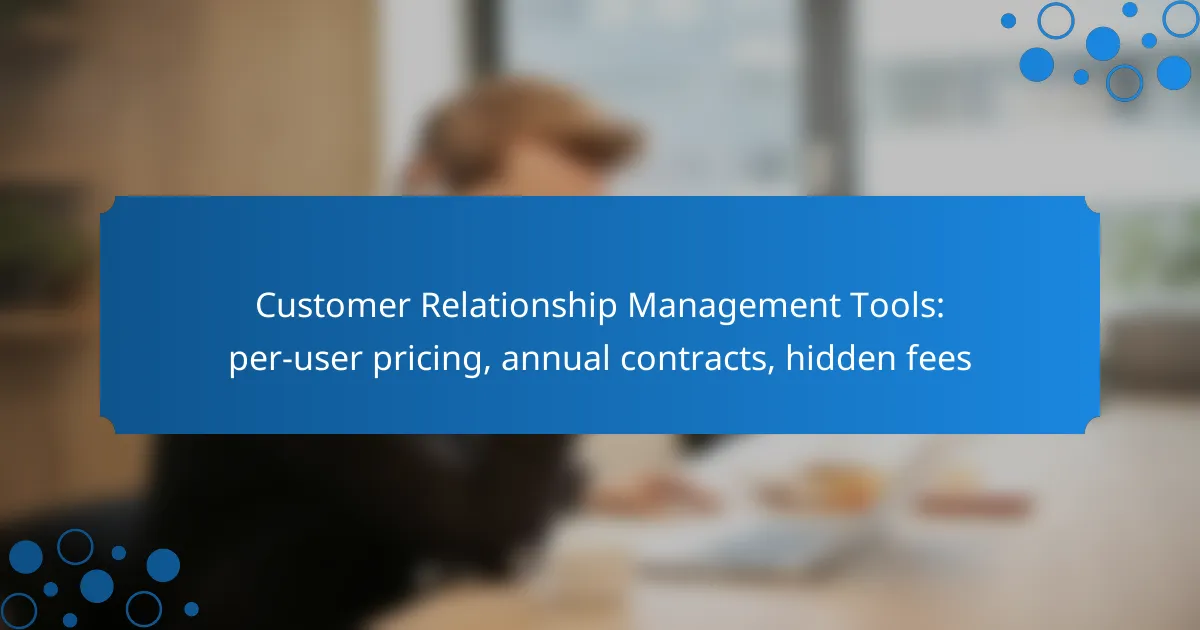Customer relationship management (CRM) tools are essential for businesses looking to enhance their sales, support, and marketing efforts. With various pricing models, including per-user pricing and annual contracts, organizations must carefully evaluate their options to avoid hidden fees that can inflate costs. Understanding these aspects ensures that businesses select the right CRM solution tailored to their needs while managing expenses effectively.
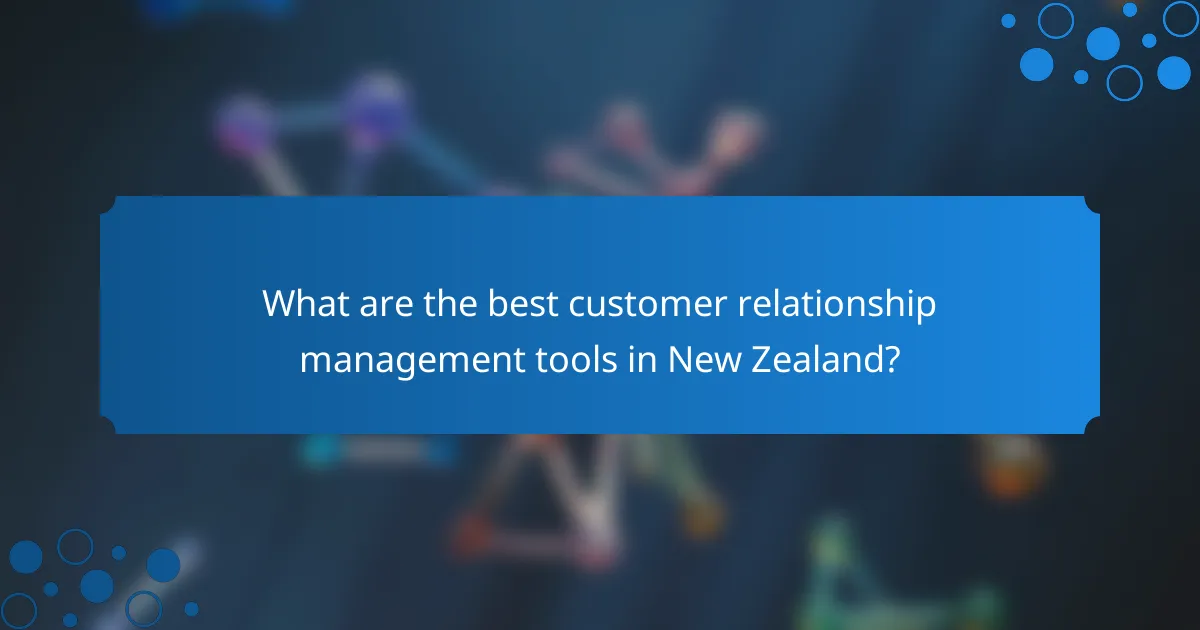
What are the best customer relationship management tools in New Zealand?
The best customer relationship management (CRM) tools in New Zealand cater to various business needs, offering features like sales tracking, customer support, and marketing automation. Popular options include Salesforce, HubSpot CRM, Zoho CRM, Pipedrive, and Freshsales, each with unique pricing structures and functionalities to suit different organizations.
Salesforce
Salesforce is a leading CRM platform known for its comprehensive features and customization options. It operates on a per-user pricing model, which can range from NZD 30 to NZD 300 per user per month, depending on the plan chosen. Businesses should consider the scalability of Salesforce, as it can grow with their needs but may also lead to higher costs as more users are added.
When using Salesforce, be aware of potential hidden fees associated with add-ons and integrations. It’s advisable to thoroughly review the pricing structure and consult with a representative to understand all costs involved.
HubSpot CRM
HubSpot CRM offers a free tier, making it an attractive option for small businesses in New Zealand. Paid plans start at around NZD 50 per user per month, providing additional features like advanced reporting and marketing tools. The user-friendly interface and integration capabilities make it a popular choice for companies looking to streamline their customer management processes.
However, businesses should be cautious of the limitations in the free version, as certain functionalities may require upgrading to a paid plan. Regularly assess your needs to ensure you’re not paying for features you don’t use.
Zoho CRM
Zoho CRM is known for its affordability and robust feature set, with pricing starting at approximately NZD 20 per user per month. It provides a range of tools for sales automation, customer support, and analytics, making it suitable for various business sizes. Zoho also offers a free version for up to three users, which is beneficial for startups.
While Zoho CRM is cost-effective, users should be aware of the learning curve associated with its extensive features. Taking advantage of the free trial can help determine if it meets your business requirements before committing to a paid plan.
Pipedrive
Pipedrive is designed primarily for sales teams, focusing on pipeline management and deal tracking. Pricing starts at around NZD 25 per user per month, which includes essential features for managing customer relationships effectively. Its visual interface allows users to easily track progress and prioritize leads.
One drawback is that Pipedrive may lack some advanced marketing features found in other CRMs. Businesses should evaluate their specific needs to ensure that Pipedrive aligns with their sales strategies.
Freshsales
Freshsales is a CRM solution that combines sales automation with AI-driven insights. Starting at about NZD 20 per user per month, it offers features such as lead scoring and email tracking. Freshsales is particularly beneficial for businesses looking to enhance their sales processes without a steep learning curve.
However, users should consider the limitations of the lower-tier plans, which may not include all features. It’s advisable to review the feature set carefully to avoid unexpected costs when upgrading to access additional functionalities.
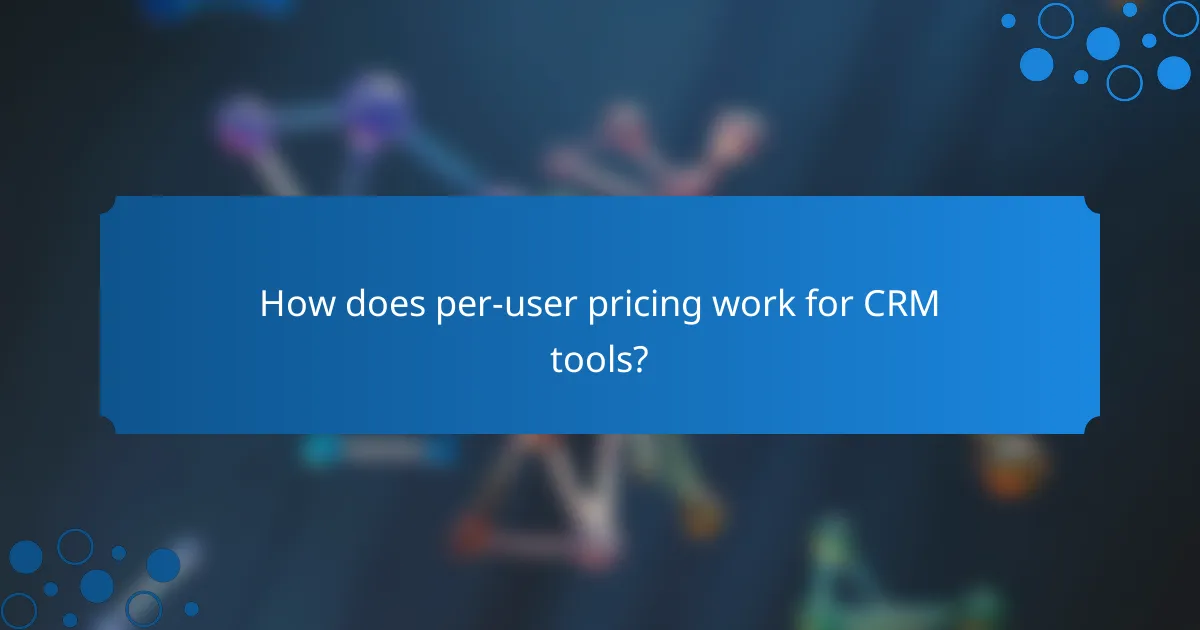
How does per-user pricing work for CRM tools?
Per-user pricing for CRM tools charges businesses based on the number of users accessing the software. This model allows companies to scale their subscriptions according to their team size, making it flexible but potentially costly as the team grows.
Monthly subscription model
The monthly subscription model allows businesses to pay for CRM access on a month-to-month basis. This option is beneficial for companies that prefer flexibility or have fluctuating team sizes, as they can easily add or remove users as needed.
However, monthly rates are typically higher than annual rates, often ranging from $15 to $100 per user, depending on the features included. Businesses should evaluate their usage patterns to determine if this model suits their needs.
Annual subscription discounts
Annual subscriptions usually offer significant discounts compared to monthly payments, often reducing costs by 10% to 30%. This model is ideal for businesses with stable teams, as it locks in pricing for a year and can lead to substantial savings.
When considering an annual contract, be mindful of potential hidden fees, such as charges for additional features or user limits. Always read the terms carefully to avoid unexpected costs during the contract period.
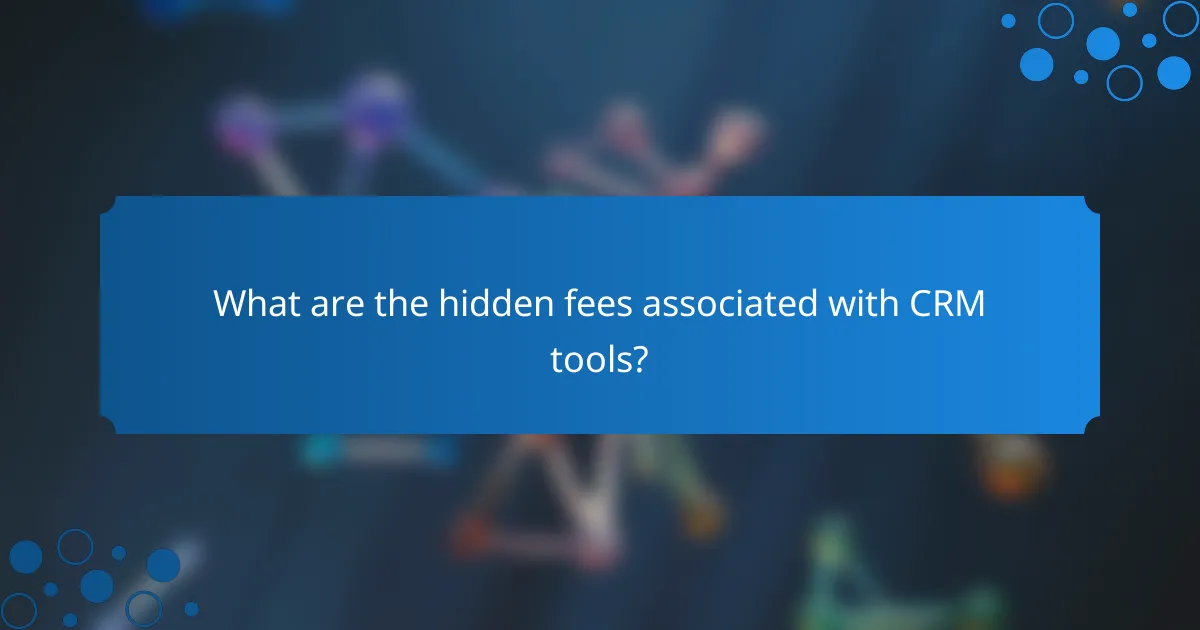
What are the hidden fees associated with CRM tools?
Hidden fees in CRM tools can significantly increase the total cost of ownership beyond the advertised pricing. These fees often include charges for setup, integration, and ongoing support, which can vary widely based on the provider and the specific features used.
Setup fees
Setup fees are one-time charges that cover the initial configuration of the CRM system. These costs can range from a few hundred to several thousand dollars, depending on the complexity of the setup and the size of your organization. It’s essential to ask potential vendors about these fees upfront to avoid surprises.
Some providers may offer free setup for basic packages but charge for advanced configurations or customizations. Always clarify what is included in the setup fee and what additional services might incur extra charges.
Integration costs
Integration costs arise when connecting the CRM system with other software tools your business uses, such as email marketing platforms or accounting software. These costs can vary significantly based on the number of integrations and the complexity involved, often ranging from a few hundred to several thousand dollars.
When evaluating CRM options, inquire about the integration capabilities and any associated fees. Some systems may offer built-in integrations at no extra cost, while others might require custom development, which can add to your overall expenses.
Support and training charges
Support and training charges can add to the ongoing costs of using a CRM tool. Many providers offer basic support as part of the subscription, but advanced support options or training sessions may incur additional fees. These can range from monthly support plans to one-time training sessions costing hundreds of dollars.
Before committing to a CRM solution, assess your team’s needs for training and support. Consider whether the vendor provides comprehensive resources or if you will need to budget for external training sessions to ensure effective use of the system.
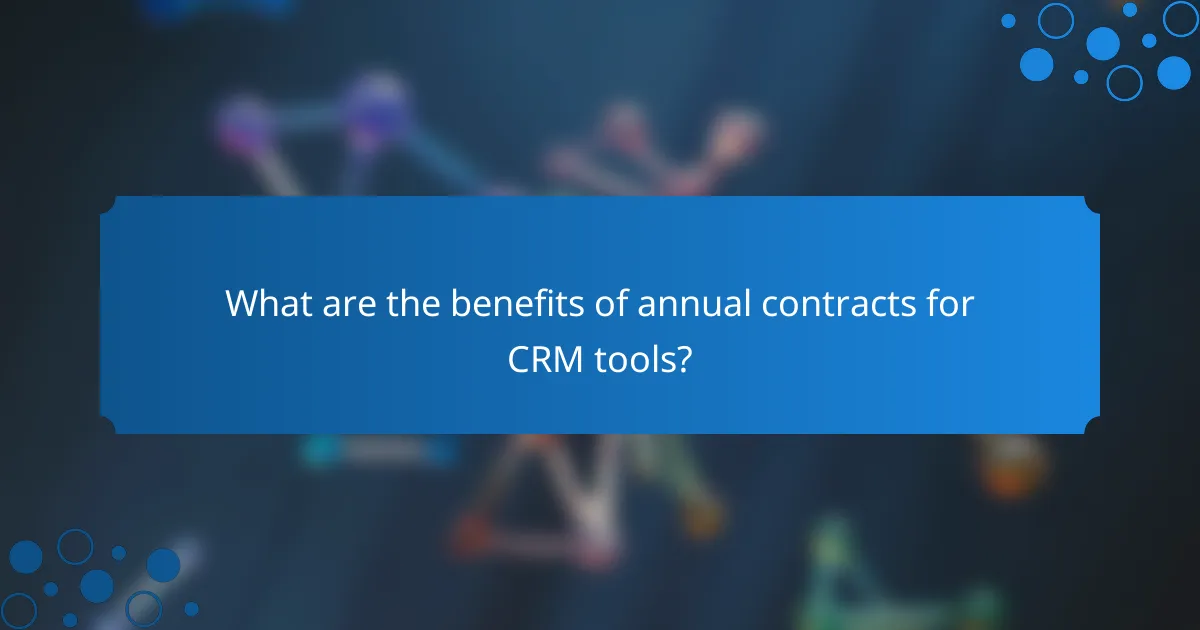
What are the benefits of annual contracts for CRM tools?
Annual contracts for CRM tools offer several advantages, including cost savings and enhanced commitment to long-term goals. By locking in a price for a year, businesses can better manage their budgets and avoid unexpected costs.
Cost savings
One of the primary benefits of annual contracts is the potential for significant cost savings. Many CRM providers offer discounted rates for customers who commit to a full year, often resulting in savings of 10-20% compared to monthly billing. This can be particularly beneficial for small to medium-sized businesses looking to optimize their expenses.
Additionally, annual contracts can help businesses avoid hidden fees that may arise with monthly subscriptions. By agreeing to a set price upfront, companies can better predict their CRM expenses and allocate their budgets accordingly.
Long-term commitment advantages
Committing to an annual contract fosters a stronger relationship between the business and the CRM provider. This long-term commitment often leads to better customer support and more personalized service, as providers are incentivized to ensure customer satisfaction over an extended period.
Moreover, an annual contract encourages businesses to fully integrate the CRM tool into their operations. This can lead to improved user adoption and a more comprehensive understanding of the tool’s features, ultimately enhancing productivity and efficiency.
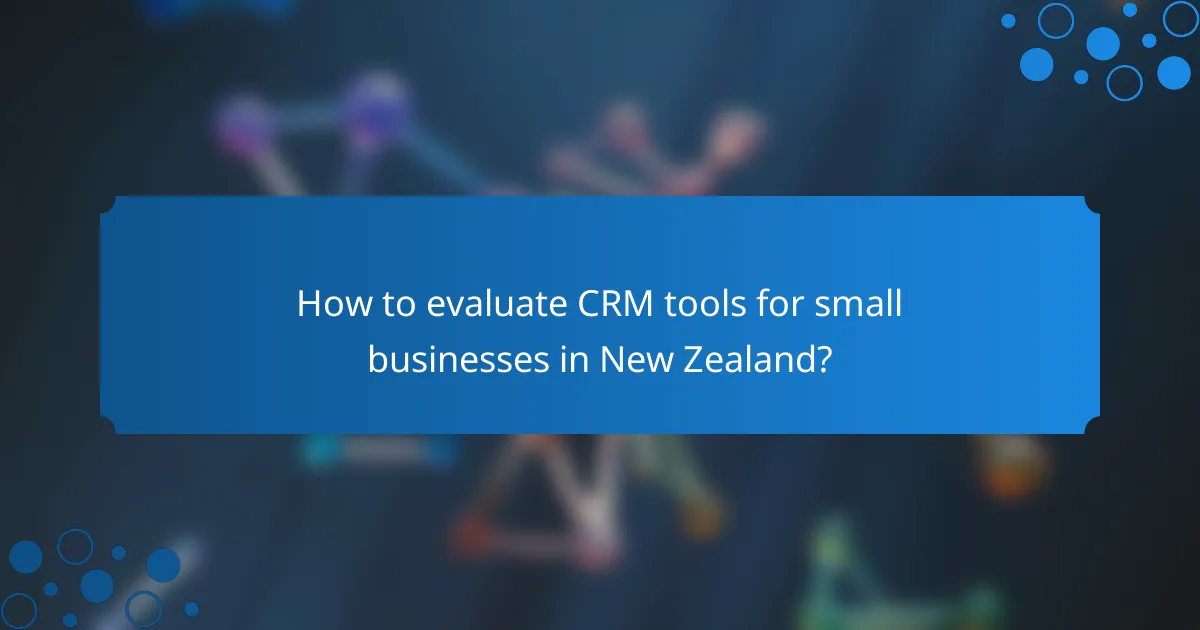
How to evaluate CRM tools for small businesses in New Zealand?
To evaluate CRM tools for small businesses in New Zealand, focus on pricing structures, contract terms, and any hidden fees. Understanding these elements will help you choose a solution that fits your budget and operational needs.
Feature comparison
When comparing CRM features, consider essential functionalities such as contact management, sales tracking, and reporting capabilities. Look for tools that offer customizable dashboards and integration with other software commonly used in New Zealand, like Xero for accounting.
It’s beneficial to create a checklist of must-have features versus nice-to-have ones. For instance, if your business relies heavily on email marketing, ensure the CRM supports automation and analytics for campaigns. Many CRM providers offer free trials, allowing you to test features before committing.
Customer support quality
Assessing customer support is crucial when selecting a CRM tool. Look for providers that offer local support options, such as phone assistance during New Zealand business hours, as this can significantly impact your experience. Check for multiple support channels, including live chat, email, and comprehensive online resources.
Read reviews and testimonials from other small businesses in New Zealand to gauge the responsiveness and effectiveness of the support team. A CRM with strong customer support can help you resolve issues quickly, minimizing disruptions to your operations.
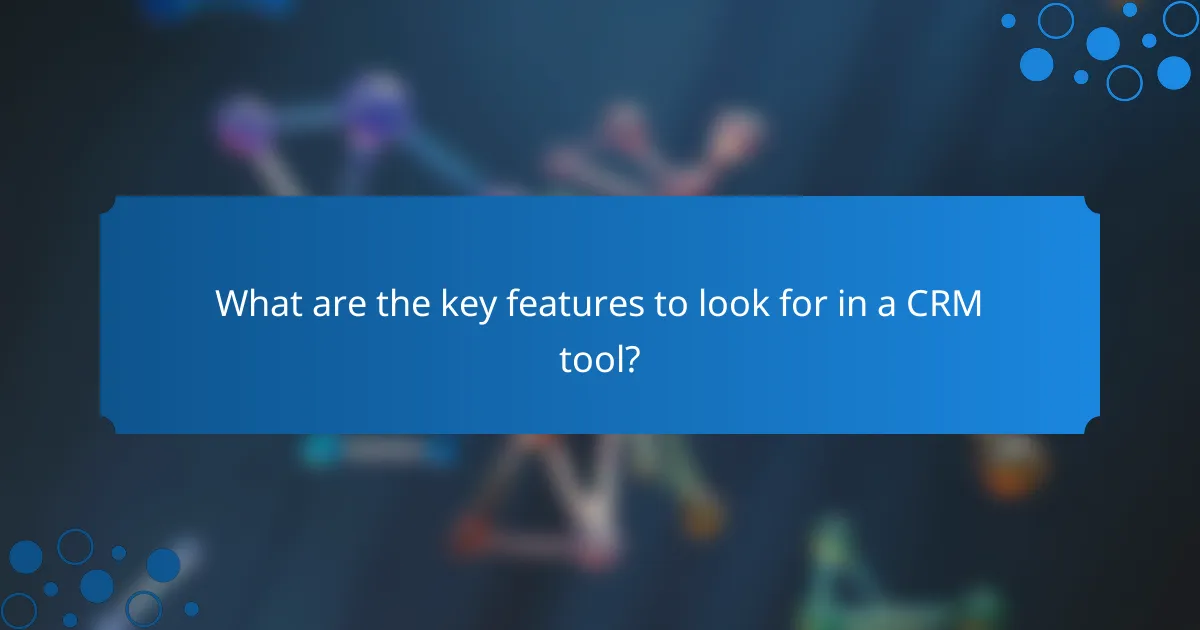
What are the key features to look for in a CRM tool?
When selecting a CRM tool, prioritize features that enhance customer interactions and streamline sales processes. Key functionalities include contact management, sales automation, and robust reporting capabilities, which collectively improve efficiency and decision-making.
Contact management
Contact management is essential for organizing and tracking customer information. A good CRM tool should allow you to store contact details, interaction history, and preferences in one accessible location. This enables personalized communication and helps build stronger relationships with clients.
Look for features like tagging, segmentation, and easy search options to quickly find and manage contacts. Ensure the tool integrates with other platforms you use, such as email and social media, to maintain a comprehensive view of customer interactions.
Sales automation
Sales automation features help streamline repetitive tasks, allowing your sales team to focus on closing deals. This includes automating follow-up emails, scheduling meetings, and tracking leads through the sales pipeline. A well-implemented automation system can significantly reduce the time spent on administrative duties.
Consider tools that offer customizable workflows and reminders to ensure no lead is overlooked. Additionally, look for integration capabilities with your existing sales tools to create a seamless workflow that enhances productivity.
Reporting and analytics
Reporting and analytics are crucial for measuring the effectiveness of your sales strategies and customer interactions. A strong CRM tool should provide insights into sales performance, customer behavior, and overall business health through customizable dashboards and reports.
Choose a CRM that allows you to track key performance indicators (KPIs) relevant to your business goals. Look for features that enable easy data visualization and export options, so you can share insights with your team or stakeholders effectively.
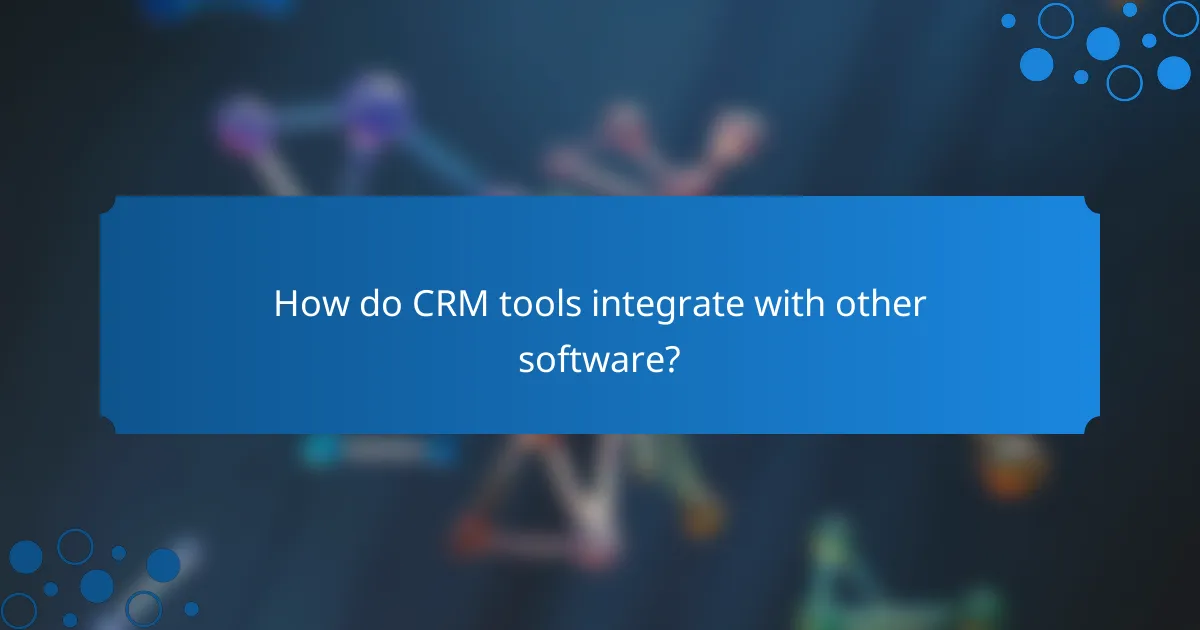
How do CRM tools integrate with other software?
CRM tools integrate with other software through APIs and third-party connectors, allowing seamless data exchange and functionality enhancement. This integration enables businesses to streamline operations, improve customer interactions, and maintain a unified view of customer data across platforms.
Common Integration Options
Common integration options for CRM tools include email marketing platforms, accounting software, and customer support systems. For instance, integrating a CRM with an email marketing tool allows businesses to automate campaigns based on customer interactions recorded in the CRM.
Other popular integrations involve tools like e-commerce platforms, social media applications, and project management software. These connections help ensure that all departments have access to the same customer information, improving collaboration and efficiency.
Considerations for Integration
When integrating CRM tools with other software, consider compatibility, data security, and the potential for hidden costs. Ensure that the systems can communicate effectively and that sensitive customer data is protected during the transfer.
Additionally, evaluate the total cost of ownership, including any fees for third-party connectors or additional features that may not be included in the base CRM pricing. This can help avoid unexpected expenses down the line.
Best Practices for Successful Integration
To achieve successful integration, start by defining clear objectives for what you want to accomplish. This could involve improving lead tracking or enhancing customer support response times.
Next, involve key stakeholders from different departments to gather input and ensure that the integration meets the needs of all users. Regularly review and test the integration to address any issues promptly and maintain optimal performance.
